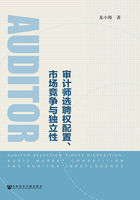
Abstract
Auditor independence has always been an important issue in accounting research. For a long time, the issue of economic dependence, client importance, low-balling, auditor tenure, non-audit service, legal liability, reputation and other factors on the auditor independence has been controversial in theoretical and empirical research, while regulators also have different views and different regulatory policies. On the basis of the existing research, firstly, this book summarizes and extracts a complete framework for the selection rights of auditors and then based on the complete competition, monopolistic competition and oligopoly competition as the audit environment, a complete analysis framework of auditor selection rights disposition, audit market competition and auditor independence is established, which reveals the internal relationship between the auditor selection rights disposition, the market competition and the auditor independence, It also provides an analytical proof and conclusion for a series of problems such as economic dependence, low-balling, auditor tenure, non-audit service, legal liability, reputation and so on how to affect the auditor independence. The results show that the impact of economic dependence, low-balling, auditor tenure, nonaudit service, legal liability, reputation on the auditor independence depends on the auditor selection rights disposition, the distribution of reputation, the degree of competition, the supervision of auditors and other factors combined effect. For the group of auditors with individual diversity and complexity, empirical studies of samples from different groups will naturally lead to different conclusions. Secondly, based on this analysis framework, this book suggests that under the disposition of different auditor selection rights, the auditors will form different evolu tionary stability strategies and lead to the formation of different independent audit habits and rules. There is a strong historical path dependence in the development of the auditing system. Finally, this book uses the analytical framework to give a new theoretical explanation and corresponding policy advice to the audit industry development.